January 30, 2014
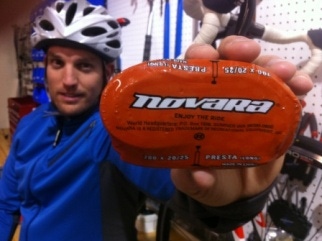
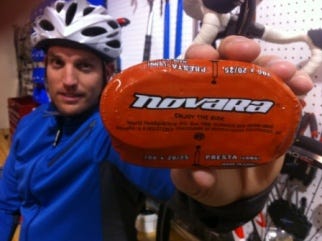
REI bike tube packaging after redesign
Customers of sporting goods retailer Recreational Equipment Inc. (REI) care about the planet-understandably, since they use the company's equipment to enjoy all aspects of the great outdoors. That concern is one reason the company is striving to ensure all of its product packaging lives up to ultra-high standards of eco-friendliness.
Eric Abraham, head of REI's packaging department, is at the forefront of the retailer's sustainability efforts. He manages development and implementation for REI Brand Gear & Apparel and Novara brand cycling product packaging. Also, he serves as the company's lead engineer and business liaison between product vendors and the global packaging suppliers. It's his mission to move the company's outdoor recreation products out of non-sustainable packaging materials (such as non-recyclable plastics, board destined to end up in landfills and more), and into packaging that's environmentally friendly and responsibly sourced.
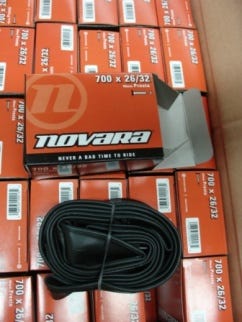
REI bike tube packaging before redesign
"To most companies, CSR [corporate social responsibility] is a big deal-and when I say CSR, I mean corporate spin and rhetoric," he says. "At REI, it's different-CSR drives innovation. The goal is for CSR to be integrated into each and everyone's job, to help solve the real business problems that we are faced with today. REI does this so that we connect sustainability to core business goals."
Abraham says one of the goals REI has in changing its packaging behavior is to encourage consumers to change their own: "We need to change our customers' lifestyles of throwaway-ism," he says.
Starting out
Abraham has worked at REI's corporate headquarters in Sumner, WA, for five years. Like many of his colleagues, his experience with the firm began in a retail store; while studying for his degree in packaging engineering at Michigan State University in East Lansing, he drove two hours each way to work at the state's only REI location in Northville. "Doing so provided me three aspects of where I am today: It's where I first learned retail operations, I learned about what being an REI staff member was like and it got me one heck of a deal to get gear at discounted rate for my active outside lifestyle."
Abraham left to study European Supply Chain at the University of Lund in Malmo, Sweden, learning the importance of following the "less is more" philosophy in retail packaging. He worked on food packaging with Nestlé for seven years and, after meeting Lee Fromson, REI vp of gear and apparel, and director of product integrity Kevin Myette, he considered a return to the company in a position that merged his packaging expertise and passion for the outdoors. Abraham got his chance when the company created a temporary position for him; he passed on high-dollar offers from a number of other companies to join the REI team.
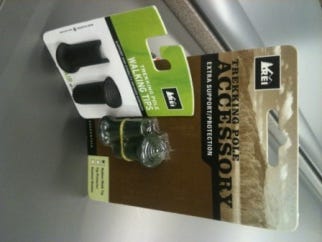
REI trekking pole packaging
"I took the challenge to follow my instinct and make a difference for an industry that would mutually and morally embrace my desire to concentrate on sustainable packaging design, not merely compelling, award-winning structures or creative graphics," he says. "It was the best decision I ever made, repeating the rewards of working on an industry level with a plethora of like-minded, passionate and collaborative people."
Sustainability steps
Since joining REI corporate, Abraham and eco-minded colleagues at all levels have joined to help the company become a packaging sustainability leader. The company recently announced plans to reduce REI-branded product packaging by 25 percent by the end of next year, and it's already made significant strides toward that goal-swapping PVC clamshells with paper-based alternatives, shipping four bicycles in one transit container (rather than singly) and using FSC-certified paperboard on its hangtags. But as Abraham states, the company's just getting started down the path.
"Sustainability is a not leap; it's about taking steps along a journey," he says.
REI's packaging team has implemented redesigns on a number of products; in each case, Abraham says, the process begins with asking the right questions:
• Could the existing design be improved to offer more sustainable benefits?
• Can its environmental impact be reduced?
• Could a new design conserve costs?
• Could the packaging be completely eliminated?
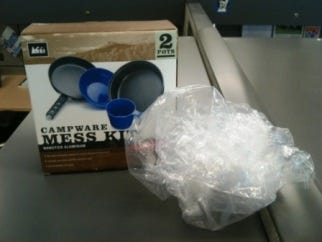
REI mess kit packaging before redesign
One of the most important factors in making packaging decisions, Abraham says, is measuring how much packaging REI consumes in any given area. For example, the company has calculated it used 130,000 lbs of paperboard for hangtags with its private brands. Determining such figures helps create a baseline and provides a guideline on how to best proceed with packaging redesigns.
"To be successful in any packaging design brought to market, we ultimately must understand the metrics of the packaging life-cycle assessment," he says. "We need to have systems thinking of the packaging solution, to know where the materials are being sourced by our vendors, the impact of the packaging resources being used and, in the end, where those resources will end up or must end up to close the loop on its life cycle."
Effective transformations
In 2010, REI changed its hangtags from 10 percent recycled content to 100 FSC-certified paperboard stock. In 2011, the company examined how hangtags were applied to products. Working with Avery Dennison, the team engineered a recycled polypropylene resin from old apparel hangers, moving from virgin resin to recycled content. While the change might be small, it helped the company move along to making improvements in other areas, and bringing the big sustainability picture into better focus.
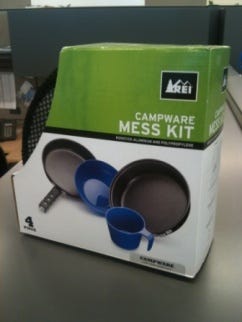
REI messk kit packaging after redesign
"I think what separates REI from most is the fact that we concentrate really hard on the little things as much as the big things," he says. "Who knew that REI used 60 staples, equating to about 27 g of ferrous metal, with each and every bike box we get from China? Or that we use 8,000 miles of tape annually to reclose bike boxes to ship bikes from our DCs to retail stores? When you measure your brand, it's then that you can design for a better tomorrow."
Another significant packaging overhaul stemmed from Abraham's own experience as a cyclist. In 2009, he competed in an "adventure race." He and his teammates struggled with the ordeal of stuffing Novara tube2go bike tubes-then housed in paperboard cartons-in their packs and bike seat bags. The folding cartons were too big and bulky to fit into the limited space the riders had available, and there was no good way to keep the tube coiled, compacted and protected once it was liberated from the outer carton (which then had to be tossed into the trash).
Once back at headquarters, Abraham examined the packaging and considered how the tube packaging might be improved.
"The aspects that made bike tubes a candidate for change was the product-to-packaging ratio (such as folding carton weight compared to the actual tube weight)," he says. "The question we asked was not to lightweight the carton, but how could be extend the life of the packaging beyond point of sale? Could the packaging serve a purpose for the rider?"
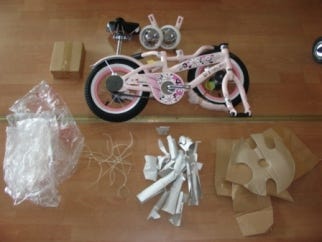
REI bike packaging before redesign
Abraham drew upon his experience as a cyclist and food-industry packaging whiz to try placing the tube in shrink wrap. He and his team settled upon EarthFirst PLA 50-mil compostable shrink wrap, from Plastic Suppliers Inc. The material enabled the tube to be packed and protected until the user needed it to fix a flat while on the trail; the new design also light-weighted the consumer packaging by approximately 98 percent.
The new packaging (produced by Printpack) presented a few additional challenges-for example, how to effectively present it at retail. Again, the REI staff turned to the food packaging field for inspiration.
"We looked to several nutrition food brands that use retail carton displays," Abraham says. "Bike tubes are roughly the size of energy bars, and so we engineered a retail display carton to help give our tube2go product shelf impact. The new shrink-wrap solution provides a perception at retail that our packaging is listening to the rider's needs to have a bike tube at the ready, to fix a flat."
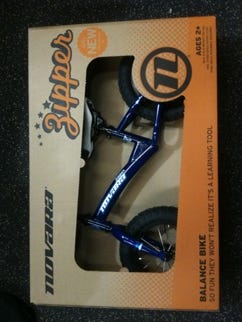
REI bike packaging before redesign
Additionally, because the new design reduced the amount of packaging surface available to communicate the product's benefits to consumers, REI has added a QR code with the new graphics, which lets users link to expert advice and a video for help. Packaging for several of the top-selling Novara bike tubes will hit retail shelves this spring.
Another area targeted for improvement was REI's Zipper children's bicycles. According to Abraham, the bikes shipped from China and Taiwan had been "mummified" in plastic packaging-zip ties, tape, polybags and the like. REI set about the challenge of redesigning the packaging using only paper, while still effectively protecting the frame during transit. Another obstacle: the external box had to help make the merchandise presentable and appealing at retail.
First, the packaging staff stabilized the bike by using a U-board insert in the bottom of the box. Next, they incorporated a perforated panel on the front of the box, which could be removed at the store to showcase the contents. The new packaging-engineered and sourced through RockTenn (Asia)-is minimized to be fully recyclable in that it's entirely paper based, composed of high-performance liner board, with more than 85 percent recycled content.
In addition, REI reworked packaging for its Campware Mess Kit products. The old cook sets came in a poly-laminated box, and the product factory polybagged every lid, pot and accessory inside. REI worked with China-based Hang Yick Paper Products to re-engineer the packaging; the end result is a die-cut design that cuts weight by 15 percent and improves shelf impact. Two kits in the revamped packaging are scheduled to hit stores this spring.
The road ahead
Thanks to its efforts to increase packaging sustainability and educate consumers about the topic, REI has taken a leadership role in the packaging industry. In October 2011, the company joined ConAgra Foods, Costco Wholesale, Microsoft and Seventh Generation in launching the Packaging Recovery Label System. Created by the Sustainable Packaging Coalition, the pilot program involves the use of voluntary product labeling intended to educate consumers on how to recycle a package after its use. Abraham also is collaborating with the Outdoor Industry Assn. and its Eco-Working Group to help develop environmental impact evaluation tools, programs, education and communication to stakeholders and consumers regarding sustainable packaging.
While REI has made a significant impact on boosting packaging sustainability, Abraham says more needs to be done, both in terms of transforming packaging materials and design, and communicating with consumers about the packaging on every level.
"We need to be radically transparent with our customers on the total product impact for each and every item we sell," Abraham relates. "Customers are already shopping and acquiring product information with smartphones. People are smart, and if a retailer is willing to innovate along the way, all that outdoor brands really need to do is use packaging to protect their product in transit and allow store signage help convert the sales. My hope is that more outdoor and cycling brands will challenge the status quo and innovate in packaging solutions to be shared across product categories. The plan is to change our world today. Afterwards, get outside and have fun, do what you can to take care of someplace you love-the life you change may just be your own."
More information is available:
Avery Dennison Corp., 626-304-2000.
Hang Yick Paper Products, +852-2427-8131.
Plastic Suppliers Inc., 866-378-4178.
Printpack, 404-460-7000.
RockTenn, 770-448-2193.
About the Author(s)
You May Also Like


